
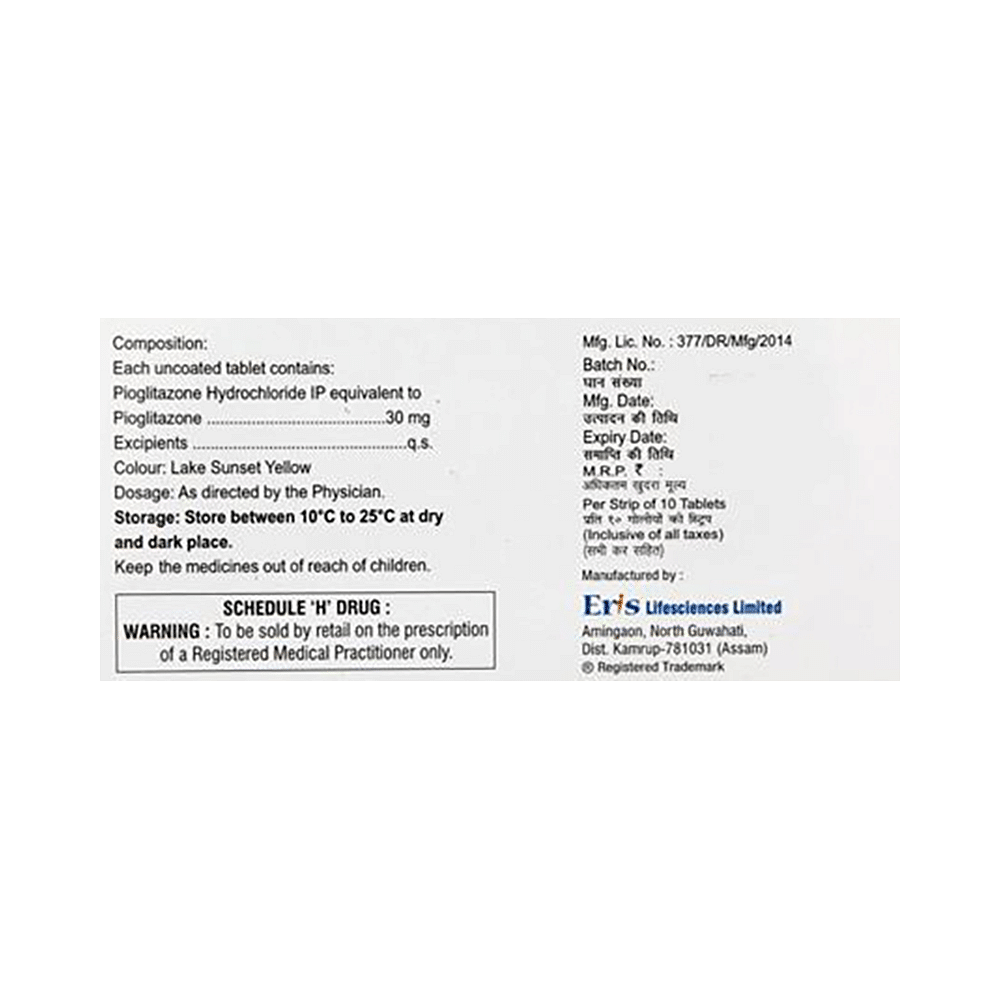
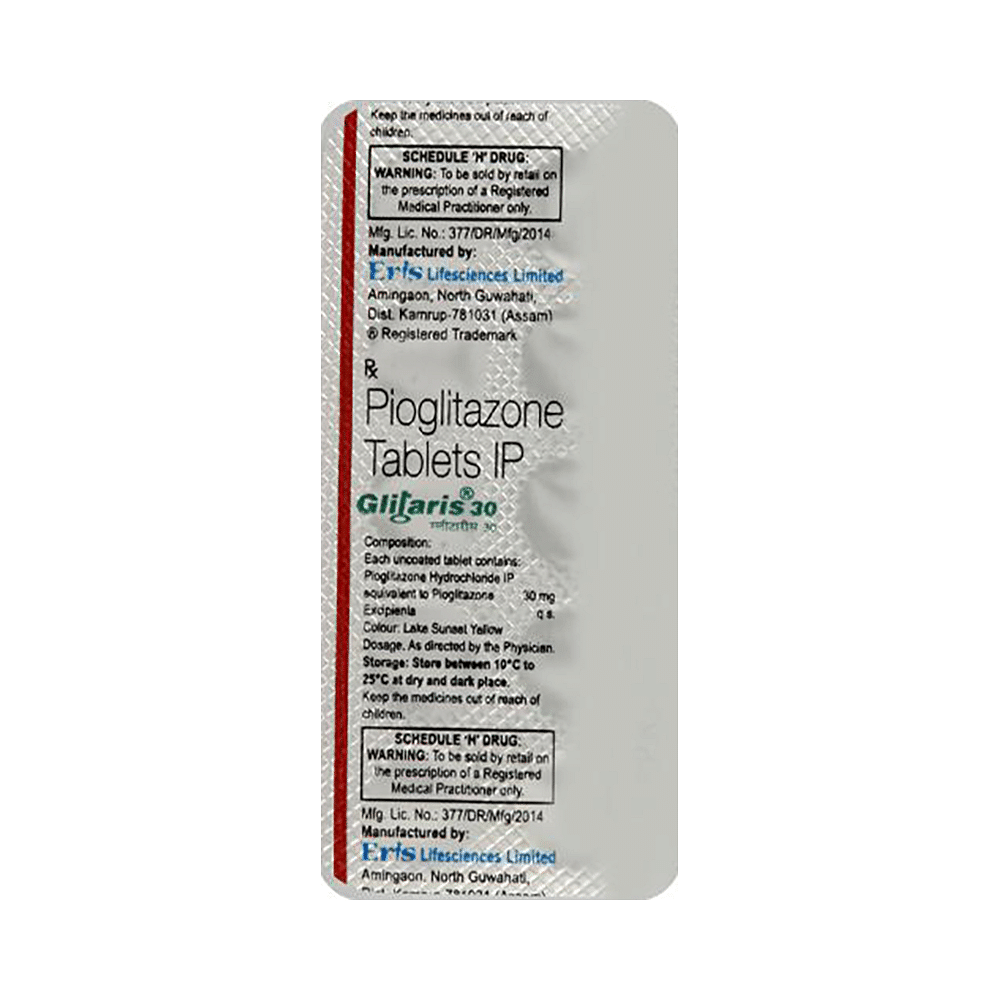
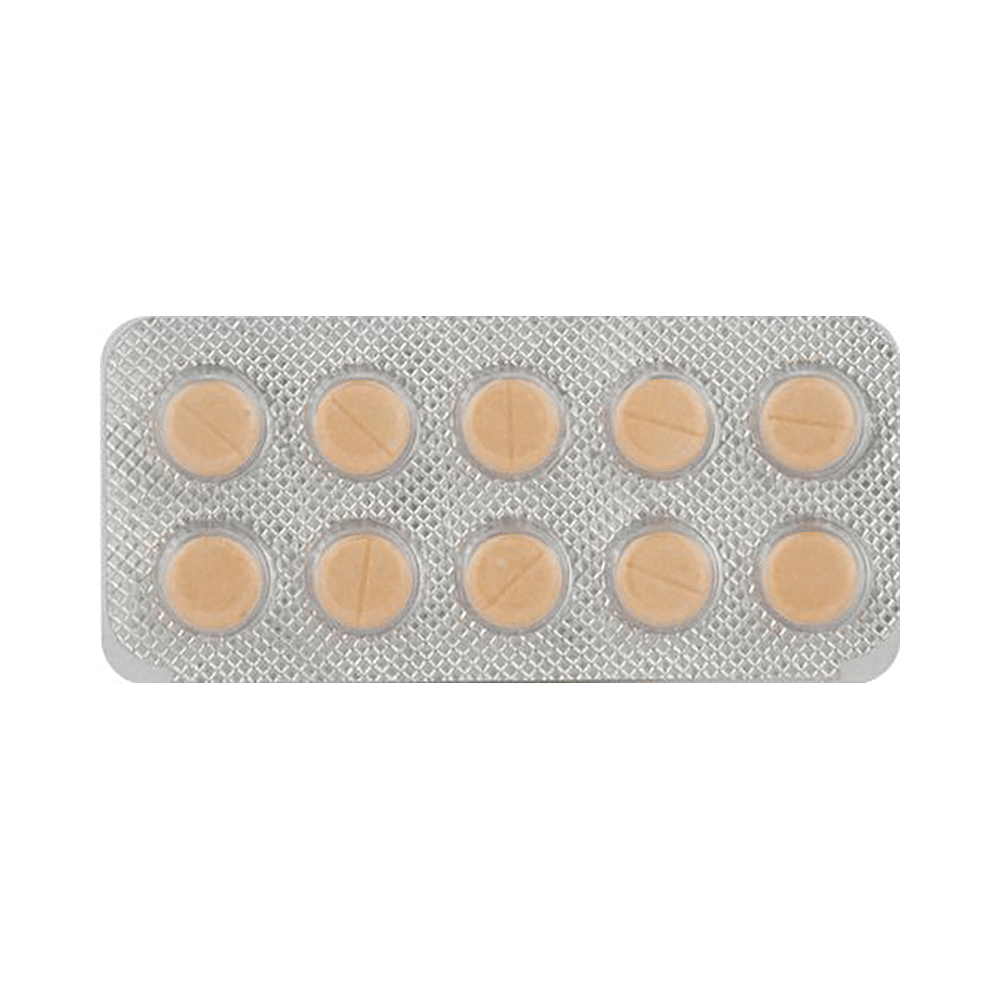
Glitaris 30 Tablet
Manufacturer
Eris Lifesciences Ltd
Salt Composition
Pioglitazone (30mg)
Key Information
Short Description
Glitaris 30 Tablet is a medicine used to treat type 2 diabetes mellitus in adults. It helps control blood sugar levels in people with diabetes.
Dosage Form
Tablet
Introduction
Glitaris 30 Tablet may be used by itself or along with other medicines. It may be taken with or without food. Take it regularly at the same time each day to get the most benefit. Your doctor will decide what dose is best for you and this may change from time to time according to how it is working.
Directions for Use
Take this medicine in the dose and duration as advised by your doctor. Swallow it as a whole. Do not chew, crush or break it. Glitaris 30 Tablet may be taken with or without food, but it is better to take it at a fixed time.
How it works
Glitaris 30 Tablet is an anti-diabetic medication. It works by increasing the body's sensitivity to insulin, a natural substance that helps control blood sugar levels.
Quick Tips
Glitaris 30 Tablet helps to control blood sugar level and avoid long-term complications. Take it only as per dose and duration suggested by your doctor. You should continue to exercise regularly eat a healthy diet and take your other diabetes medicines along with Glitaris 30 Tablet. Full effects may be visible after several weeks of starting Glitaris 30 Tablet. Keep taking it as prescribed by your doctor. Monitor your blood sugar level regularly while taking this medicine.
Related Medicines

Pionorm-30 Tablet

Pioglit 30 Tablet
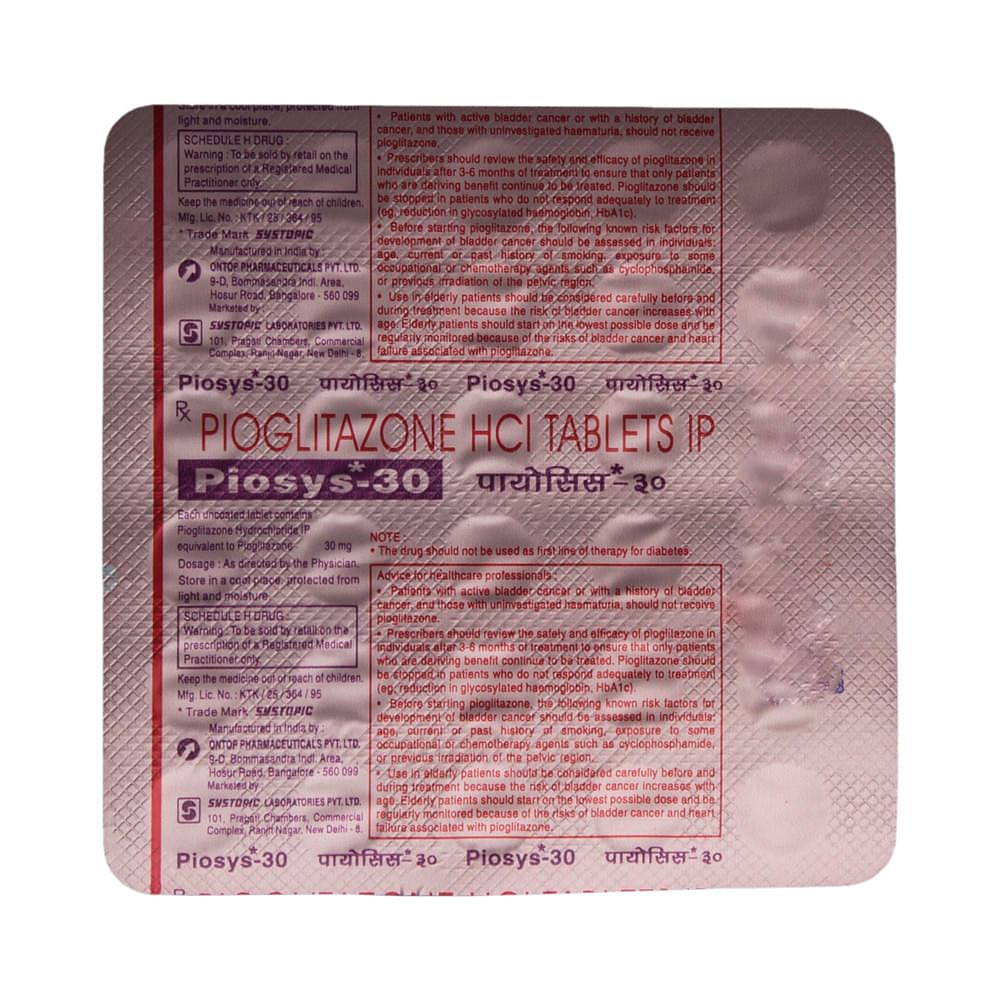
Piosys-30 Tablet
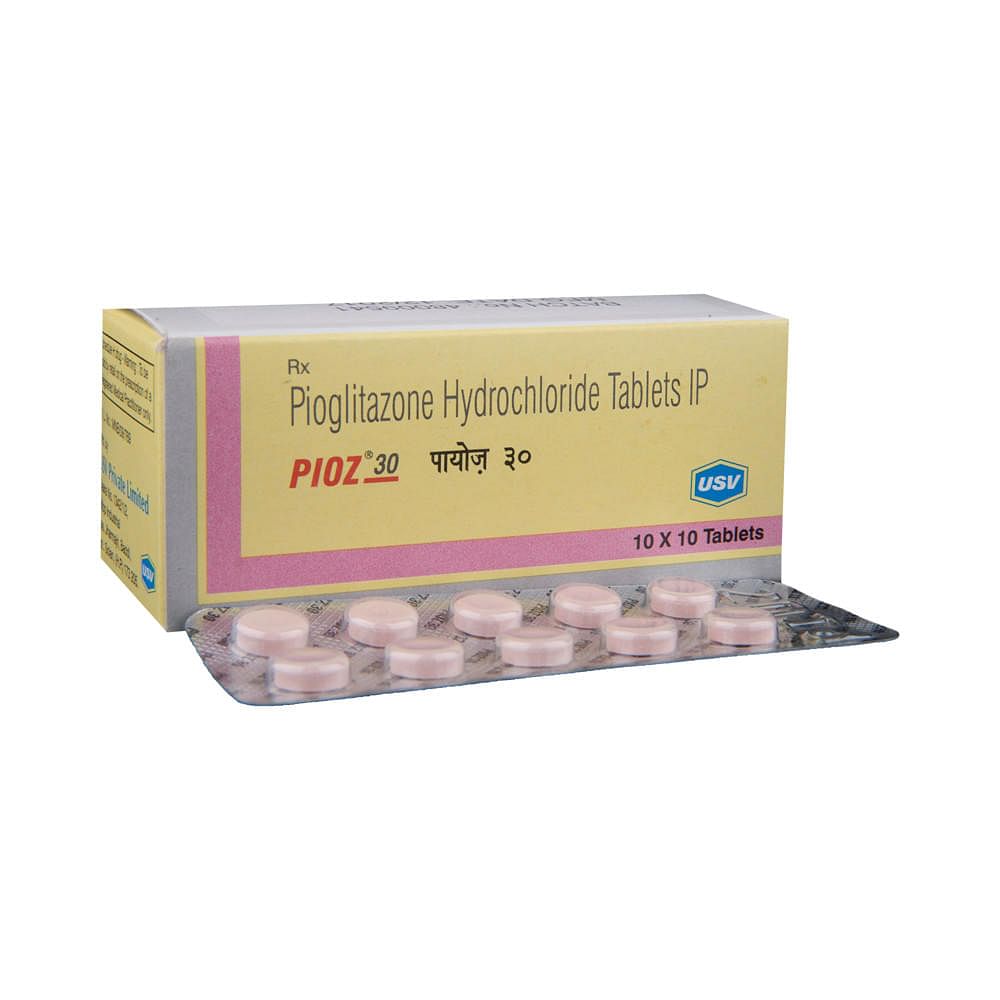
Pioz 30 Tablet

Plum 30mg Tablet

Piomerc 30mg Tablet

Piokind 30 Tablet

Glita 30mg Tablet

Glutazone 30mg Tablet

Biodib 30 Tablet
Frequently asked questions
Does Glitaris 30 Tablet cause weight gain?
Glitaris 30 Tablet can commonly cause weight gain, which may be dose-dependent. Potential causes include fat accumulation. However, in patients with heart failure, water retention within the body may contribute to weight gain. Therefore, monitoring weight is essential for heart failure patients.
Can Glitaris 30 Tablet cause heart failure?
Glitaris 30 Tablet can lead to fluid retention, potentially worsening or triggering heart failure. Doctors typically begin with the lowest recommended dosage and gradually increase it while treating patients who have at least one risk factor for heart failure (e.g., previous heart attacks, coronary artery disease, elderly). Heart failure is more likely when used in conjunction with insulin.
Can I take Glitaris 30 Tablet and metformin together?
Yes, Glitisaris 30 Tablet can be combined with metformin when sufficient blood sugar control was not achieved by using metformin alone. This combination is suitable for adult patients with type 2 diabetes mellitus and those with overweight who have poor blood sugar control.
What time of day should I take Glitaris 30 Tablet?
It's usually prescribed once daily, and you can take it anytime, but preferably at the same time each day. You can consume it with or without food.
How long do I need to take Glitaris 30 Tablet? Can I stop the medicine for some time?
Continue taking Glitaris 30 Tablet as prescribed by your doctor. Diabetes treatment is long-term, and you may require lifelong medication use. If you need to stop it, consult your doctor who will suggest an alternative. Do not discontinue using this medication without consulting your doctor as this could lead to a surge in blood sugar, which could be harmful.
Does Glitaris 30 Tablet affect the liver?
Yes, Glitaris 30 Tablet may increase liver enzymes. If your liver enzymes rise while on treatment with this medication, it's important to stop taking it and consult your doctor. Regular monitoring of liver enzymes is essential while on this medication. It's not recommended for patients with pre-existing liver diseases.
What kind of medicine is Glitaris 30 Tablet? Is it like metformin?
Glitaris 30 Tablet belongs to the thiazolidinediones class of anti-diabetic medications. It helps control blood sugar levels by enhancing how your body uses a hormone called insulin. This is achieved by increasing cell sensitivity to insulin that your body produces.
Can Glitaris 30 Tablet cause bladder cancer?
Glitaris 30 Tablet may slightly increase the risk of bladder cancer, albeit this occurrence is rare. If you experience blood in your urine, pain when urinating, or a sudden need to urinate, consult your doctor immediately during treatment with this medication. Glitaris 30 Tablet should not be used by individuals with a history of bladder cancer or any other pre-existing bladder conditions.


